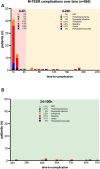Temporal profiling of M-TEER-related complications
- PMID: 39865608
- PMCID: PMC12055382
- DOI: 10.1002/ehf2.15220
Temporal profiling of M-TEER-related complications
Abstract
Aims: Transcatheter edge-to-edge repair of the mitral valve (M-TEER) is known for its low complication rates. However, the optimal level and duration of post-procedural care remain unclear. This study aimed to identify the specific timeframe of post-procedural complications following M-TEER.
Methods and results: We conducted a retrospective analysis of 865 patients who underwent M-TEER at the University Hospital Düsseldorf between August 2010 and August 2023. Our analysis focused on a comprehensive examination of all acute post-procedural complications (1-100 h), considering the time point of occurrence or diagnosis. The complication analysed included cardiogenic shock, pericardial tamponade, stroke, cardiac arrhythmias, bleeding, acute kidney injury, myocardial infarction, peripheral vascular ischaemia and in-hospital mortality.
Results: The median age was 80 (74, 84) years, and the EuroScore II was high (6.5 [4.0, 12.0] %). Functional mitral regurgitation (MR) was more common than degenerative or mixed MR (69% vs. 20%. respectively; 11%). Technical success rate was 97.2%. Overall, acute post-procedural complications occurred in 87 patients (10.1%). Most complications (75.9%) occurred within the first 4 h post-procedure. 12.6% of the complications occurred during the period between 4 and 24 h post-procedure, and 11.5% of the complications happened between 24 and 100 h post-procedure. Life-threatening complications were observed only within the first 4 h post-procedure.
Conclusions: The majority of post-procedural complications after M-TEER occur within the first 4 h, with pericardial tamponade and major bleeding occurring only during this period. These findings provide valuable insight for physicians in determining the optimal surveillance and monitoring duration after M-TEER within clinical settings.
Keywords: Events; MitraClip; Mitral regurgitation; Pascal; Safety.
© 2025 The Author(s). ESC Heart Failure published by John Wiley & Sons Ltd on behalf of European Society of Cardiology.
Conflict of interest statement
P.H. has received travel support and educational grant from Abbott Medical GmbH and Edwards Lifesciences and an unrestricted research grant from Edwards Lifesciences.
Figures

References
-
- Otto C, Nishimura R, Bonow R, Carabello B, Erwin J III, Gentile F, et al. 2020 ACC/AHA guideline for the management of patients with valvular heart disease: executive summary: a report of the American College of Cardiology/American Heart Association Joint Committee on Clinical Practice Guidelines. J Am Coll Cardiol 2021;77:450‐500. doi:10.1016/j.jacc.2020.11.035 - DOI - PubMed
-
- Bedogni F, Testa L, Rubbio AP, Bianchi G, Grasso C, Scandura S, et al. Real‐world safety and efficacy of Transcatheter mitral valve repair with MitraClip: thirty‐day results from the Italian Society of Interventional Cardiology (GIse) registry of Transcatheter Treatment of Mitral Valve RegurgitaTiOn (GIOTTO). Cardiovasc Revasc Med 2020;21:1057‐1062. doi:10.1016/j.carrev.2020.01.002 - DOI - PubMed
MeSH terms
LinkOut - more resources
Full Text Sources
Medical

